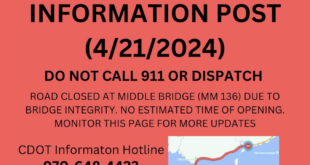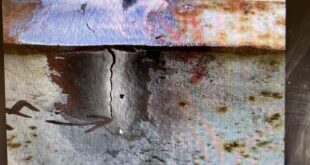As finances fall into the red, the search for funding is on
The Gunnison Valley Hospital board of trustees might be asking taxpayers for a mil levy increase this November to help the facility weather financial hard times.
Approval for a ballot initiative to impose the tax increase would have to come from the Gunnison county commissioners. At a work session on Tuesday, March 10, the commissioners listened to various options the board of trustees is considering to bring the hospital out of the red.
“The bottom line is, if we’re going to accomplish our mission, as defined by the board, we’re going to need some funding through new relationships with healthcare entities or tax support,” said GVH chief executive Randy Phelps.
The “new relationships” could include joining with a larger healthcare system that could give GVH an infusion of capital, a management agreement with an equity share, or some other form of private investment.
Phelps also said, “If we’re thinking about this holistically, then selling the hospital to a for-profit entity is a possibility.”
The hospital is currently owned by Gunnison County, but operates independently of the county as an enterprise fund.
The first option, as far as the GVH board of trustees is concerned, would be to find a solution locally. They could do that through the creation of a hospital district, similar to the county’s library district, which has the ability to go directly to taxpayers for support. That arrangement would be more of a long-term solution, however.
“What we’re looking for now is to get [the county commissioners’] consent to investigate the possibility of going to voters to consider a tax in support of the hospital,” said Phelps. “Every other hospital in our region receives a dedicated amount of tax support.”
The hospital has already considered hiring Utah-based Dan Jones and Associates, which GVH has used in the past, to conduct a community survey to determine support for a bond initiative. Phelps said the board would like to see results from that survey as soon as the end of April.
The level of support Phelps suggested to the commissioners would be one mil on property tax, or approximately $100 for every $100,000 of assessed property value.
The extra capital would be used only for operational expenses, according to GVH board chairman Bob Brickman, and not as a means for the hospital to generate capital.
He suggested that the mil levy could have a sunset included in it that would cut off tax funding once it reached a certain level.
Commissioner Jim Starr said that a greater concern might be the public’s concern that the hospital hasn’t done enough to contain costs and generate revenue in some way other than taxing.
“I think people are going to be asking two questions: are you maximizing revenues and are the costs as low as they can go? If you can answer those questions and people believe you, then I see how [the bond initiative] might be successful,” he said.
Part of the hospital’s trouble in generating revenue has been treating patients who aren’t able, or who are unwilling, to pay for services. Last year, treating those patients led to a $700,000 increase in net accounts receivable, bringing the total amount of bills that have not been paid up to $4.4 million.
According to Phelps, every cost-cutting measure has been taken and department managers remain open to cut costs further. But, he says, a certain amount of costs associated with running a healthcare facility are set and reducing them would diminish the quality of care being provided.
“For what it’s worth, I think you might consider an effort to educate the community about your efforts before you put out a survey, because if the results come back negative and then you start an education campaign, you’ll have to work twice as hard to gain that support,” said Starr.
Phelps also provided the commissioners with a grim picture of the future, reinforcing the need for more funding options. He said small facilities like GVH will bear the brunt of Gov. Ritter’s initiative to tax hospitals and President Obama’s plan to extend healthcare coverage for 50 million Americans.
“The forecast is a little bit problematic. The governor has proposed that Colorado hospitals be taxed and it is a published fact that 13 percent of those hospitals will be losers on this deal. [Chief financial officer Tim Cashman] and I are fairly confident that we’ll be one of those losers,” said Phelps.
He went on to say that extending Medicare and Medicaid coverage to more people while cutting the reimbursement doctors and hospitals get, as the president has suggested, could hurt the hospital’s financial standing further.
“When those programs open up, quite frankly people come out of the woodwork to take advantage of the care that is provided for low or no cost and we really can’t support that without some additional help,” said Phelps.
The commissioners said they would consider the ballot initiative proposal and put it on the agenda for next week’s regular meeting for discussion, when a decision can be made.
 The Crested Butte News Serving the Gunnison Valley since 1999
The Crested Butte News Serving the Gunnison Valley since 1999





